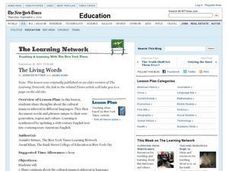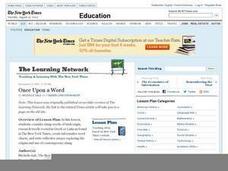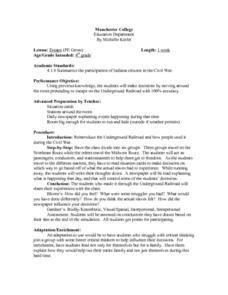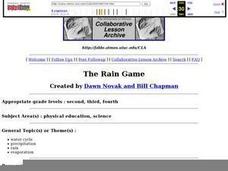Curated OER
Why is Reading Important?
Ninth graders discuss why reading is an important skill for them to use in their lives. In groups, they examine the problems someone might have out in the world if they are illiterate. They practice reading in ways that it makes it fun...
Curated OER
The Living Words
Pupils translate a 16th century English text into contemporary English. They discuss the cultural uniqueness and significance of language and document words or phrases currently used in their daily lives. They use this list to aid in...
Curated OER
You Are Here
Students simulate a course with and without a guide as if they were an airplane with and without air traffic control. They read and discuss the article "For Airlines, Hands-On Air Traffic Control". They discuss challenges that air...
Curated OER
Once Upon a Word
Young scholars explore the derivations and usage of common slang terms. Through internet research and discussion, students consider the Latin and Greek roots of contemporary slang terms. Groups complete an etymology chart documenting...
Curated OER
When the News is the News
Students share opinions about the factors that influence their newspaper-reading decisions. They study the News Corporation's purchase of Dow Jones & Company by reading and discussing the article "Dow Jones Deal Gives Murdoch a...
Curated OER
Hook, Lead Line, and Thinker
Young scholars explore, examine and study the format of an opinion essay by viewing one author and activist that is helping women find their voices by reading and discussing the article, "Stop the Presses, Boys! Women Claim Space on...
Curated OER
Introducing George Washington
Students write down facts about George Washington. In this lesson on our first president, students listen to a story about George Washington and retell four facts about him.
Curated OER
Rock Differences
First graders find the differences in rocks. In this rock lesson, 1st graders look at different rocks and write at least 3 ways that they look or feel different. They discuss how rocks are formed in different ways and how this affects...
Curated OER
Factoring Trinomials
Students factor trinomials. In this algebra lesson, students use special patterns and formulas to factor. They utilize algebra tiles as a hands-on method for gaining practice with trinomials.
Curated OER
Counting Blood Cells
Students observe number sense by participating in an estimation activity. For this blood cells lesson, students identify the importance of blood cells in the human body and discuss how tiny they are. Students utilize paper dots as a...
Curated OER
Design a School
Students create a design for their ideal school. They work in groups to design a part of the school and put the designs together to create one complete school design.
Curated OER
Making Headlines
Students consider their personal opinions about the news and politics, read about the public relations drive behind the 2004 presidential election, and gather information for a press release promoting either Mr. Bush or Mr. Kerry.
Curated OER
Escape - Civil War
Fourth graders role play the Underground Railroad in this lesson. They review the Underground Railroad and how people used it during the Civil War. They then are divided into groups, and role play with each group taking a different...
Curated OER
Before It Was Wisconsin-Rock Art
Students examine how archaeologists make use of all forms of artifacts including rock art to try to piece together past cultures. They make their own rock art so they have a feel for how such pieces were made out of natural materials.
Curated OER
Balance
Students distinguish between symmetrical (formal) and asymmetrical (informal) balance. They create a black and white picture which displays both symmetrical balance and asymmetrical balance.
Curated OER
The Rain Game
Students simulate the precipitation process by playing a game. They simulate the behavior of actual cloud drops and rain drops.
Curated OER
Japanese Society
Students conduct research into the life of being a person who is Japanese. The lesson uses essential questions in order to guide the research. Classroom activities are used to encourage discussion.
Curated OER
Where in the World?
Students participate in an activity promoting them to use different balancing skills while they review/learn important facts about each of the continents.
Curated OER
100 More 100 Less
Third graders review the concept of place value and number sense. With a partner, they are given four cards with numbers on them. Using the cards, they practice making new numbers and completing addition and subtraction to find the...
Curated OER
Ports in the Storm
Students explore national security issues related to the possibility of a Dubai-owned company operating an American port. Opinions are solicited and debated.
Curated OER
An All American Success Story
Young scholars read the All American Success Story and answer comprehension questions. They write an essay about a person they consider to be a successful person.
Curated OER
From Object To Story
Students engage in a study that focuses upon the study of artifacts for the purpose of defining the heritage of family. They conduct research using a variety of resources. The information is used in order to create a personal family...

























